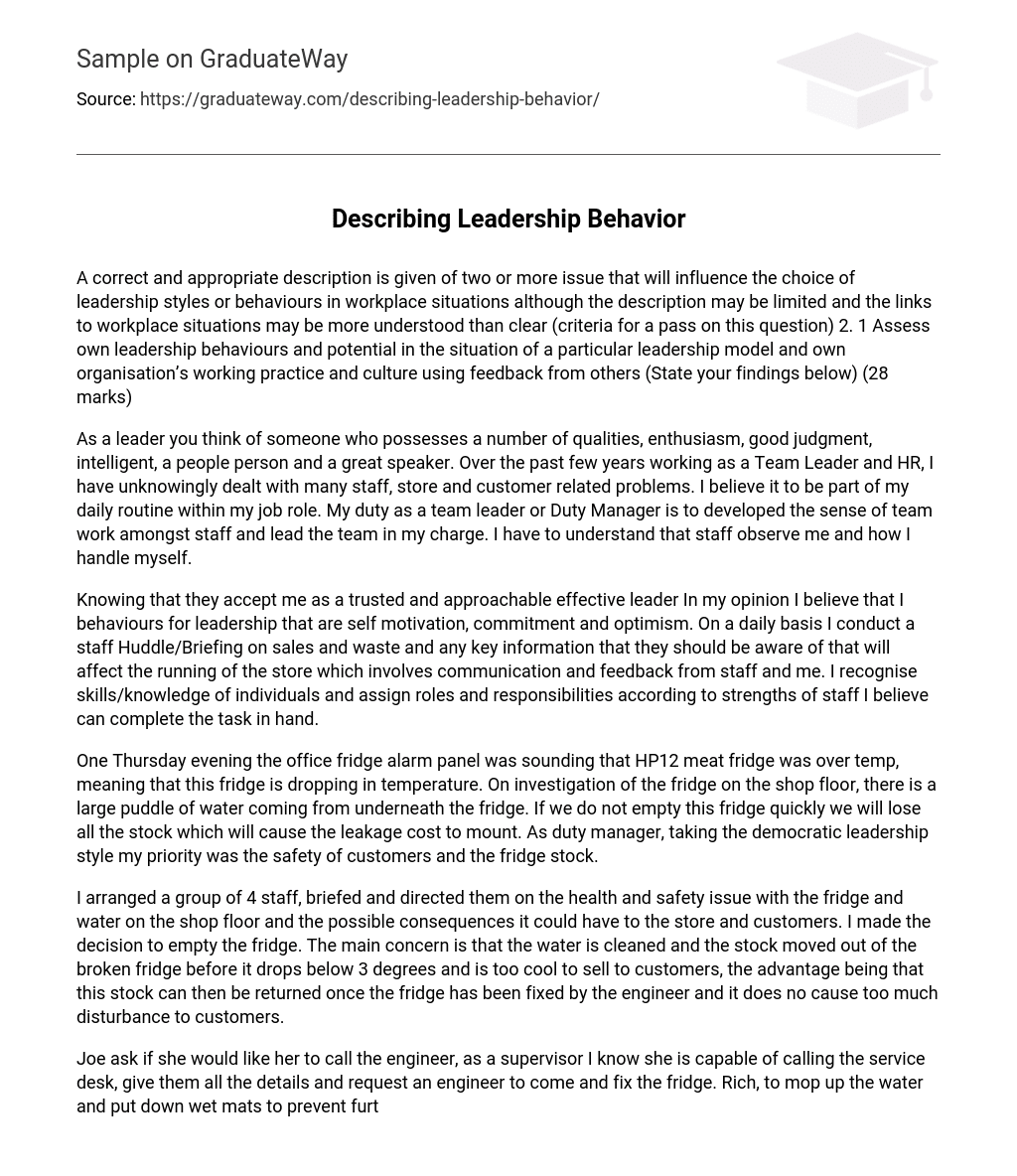A correct and appropriate description is given of two or more issues that will influence the choice of leadership styles or behaviors in workplace situations. However, the description may be limited and the links to workplace situations may not be clear. Criteria for passing this question include assessing one’s own leadership behaviors and potential within a specific leadership model and the organization’s working practice and culture. This assessment should be done using feedback from others. Below are the findings: (28 marks)
As a leader, you envision someone who embodies various qualities like enthusiasm, sound judgment, intelligence, exceptional interpersonal skills, and excellent public speaking abilities. In my role as a Team Leader and HR, I have encountered numerous challenges involving the staff, store, and customers without even realizing it. I consider it to be an integral part of my daily responsibilities within my job position. As a team leader or Duty Manager, it is my responsibility to foster a sense of teamwork among the staff and guide the team under my supervision. I need to be aware that the staff observe my actions and evaluate how I handle various situations.
In my opinion, as a trusted and approachable effective leader, I believe that self-motivation, commitment, and optimism are key behaviors for leadership. On a daily basis, I conduct a staff Huddle/Briefing on sales, waste, and any important information that may affect the store’s operations. This involves communication and feedback from both staff and myself. Additionally, I acknowledge the skills and knowledge of each individual and assign roles and responsibilities based on their strengths to ensure tasks are completed successfully.
On a certain Thursday evening, the alarm panel of the office fridge was ringing to indicate that the HP12 meat fridge was experiencing a temperature increase. Upon inspecting the fridge on the shop floor, it was discovered that there was a significant amount of water coming from underneath it. It is imperative for us to empty this fridge promptly in order to prevent any further losses and potential costs due to leakage. As the duty manager, my main concern was maintaining the safety of our customers and preserving the stock in the fridge.
I organized a team of 4 employees and provided them with information and instructions regarding the health and safety concerns related to the fridge and water on the shop floor. I emphasized the potential consequences to both the store and customers. I decided to empty the fridge to address these concerns. Our main priority is to ensure that the water is properly cleaned and that all stock is removed from the broken fridge before its temperature drops below 3 degrees Celsius, rendering it too cold to sell to customers. The advantage of this approach is that once the engineer fixes the fridge, the stock can be returned without causing significant inconvenience to customers.
Joe asks if she would like him to call the engineer. As a supervisor, I know she is capable of calling the service desk, providing them with all the details, and requesting an engineer to come and fix the fridge. Rich should mop up the water and place wet mats to prevent any further water hazards. Bill and Sam should collect the trays, remove the fridge stock, and take it to the backup fridge in the warehouse. Since this task involves manual lifting, they are quite capable of handling the heavy trays.
Overall, the team successfully worked together to accomplish the task of emptying the fridge, ensuring no disruption to customers and no loss of stock. After two hours, the engineer arrived to fix the fridge, and once completed, the team thanked them and resumed their own tasks. I keep the team motivated and happy by providing necessary training, support, positive messages, constructive feedback, and assistance with problem-solving. However, on one occasion, a staff member requested time off on a holiday request form but had no remaining yearly holiday entitlement.
After refusing the holiday, I was approached by a member of staff who wanted to know the reason behind the refusal. I showed empathy and attentively listened to their concerns. I explained that, despite their personal circumstances, they still had a responsibility to the company. The staff member then explained that they needed time off for a funeral, which helped me better understand their situation. In accordance with the company’s funeral policy, we reached an agreement that the staff member would take unpaid time off, enabling their hours to be worked as overtime by another colleague. This arrangement was necessary as there were no additional hours available within the company to cover their absence.
I explained to my colleague that he could make up the missed hours by working overtime shifts later in the week. This allowed him to take time off without causing disruption to the company. He expressed gratitude for my willingness to listen and accommodate his needs.





